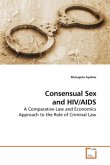A large body of jurisprudence has developed in Canada criminalizing the conduct of HIV positive persons who transmit or expose others to the HIV infection in an equivocal attempt to be seen to be doing something about individuals who are perceived to be driving the HIV epidemic. Convictions have been obtained for charges ranging from aggravated assault to, most recently, murder. The Cuerrier judgement, a landmark decision of the Supreme Court of Canada, left a number of issues unresolved. Given the ambiguities in the decision, this monograph addresses the unfortunate consequences resulting from the Cuerrier's decision, arguing that while criminalization of non-disclosure may seem logical to many, at the same time it carries a significant public health consequences. The author's attempt is to show that criminalization is an inadequate strategy to prevent further HIV infection, its increased use in practice is misguided, and counterproductive to public health goals, thus alternatives to the routine criminalization of HIV transmission that may enhance the goals of public health should be considered.
Bitte wählen Sie Ihr Anliegen aus.
Rechnungen
Retourenschein anfordern
Bestellstatus
Storno








